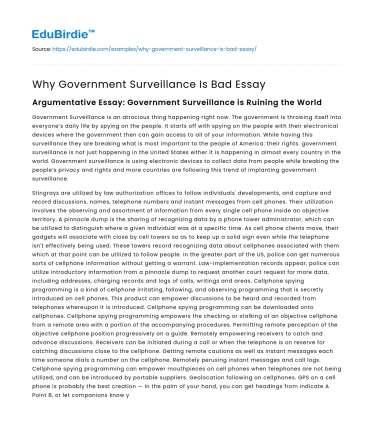Introduction
In the digital age, government surveillance has become an increasingly pervasive phenomenon, raising significant concerns about privacy and civil liberties. The advent of sophisticated technology has enabled state apparatus to monitor citizens' activities more intricately than ever before. The justification of such surveillance often hinges on national security and public safety, yet it poses profound implications for individual freedom and democratic rights. This essay argues that government surveillance is detrimental to society, undermining the fundamental principles of privacy and liberty. Through the examination of real-life cases and theoretical perspectives, this discourse will explore the adverse impacts of surveillance on personal privacy, the potential for abuse of power, and the chilling effect on free expression. By addressing counter-arguments, this essay emphasizes the necessity for regulatory frameworks that protect citizens from unwarranted intrusion while balancing security needs.
Invasion of Personal Privacy
The encroachment upon personal privacy is arguably the most immediate and tangible consequence of government surveillance. Privacy, a cornerstone of individual autonomy, is compromised when states engage in extensive monitoring of personal communications, internet usage, and even physical movements. Edward Snowden's revelations in 2013 highlighted the vast scope of surveillance conducted by the National Security Agency (NSA), which included the collection of metadata from millions of citizens without their consent or knowledge (Gellman, 2013). This breach not only undermines privacy but also erodes public trust in governmental institutions. Legal scholar Daniel J. Solove argues that "privacy is essential to freedom and dignity" and that its erosion through surveillance represents a significant threat to democratic societies (Solove, 2007).
Save your time!
We can take care of your essay
- Proper editing and formatting
- Free revision, title page, and bibliography
- Flexible prices and money-back guarantee
The pervasive monitoring enabled by technologies such as facial recognition and data mining further exacerbates this issue. Governments can now construct detailed profiles of individuals, making privacy a relic of the past. Critics point out that such measures disproportionately affect marginalized communities, who are often subject to heightened scrutiny. The European Court of Human Rights, in its judgment in Big Brother Watch v. United Kingdom, underscored the lack of adequate safeguards in mass surveillance practices, deeming them incompatible with the right to privacy under the European Convention on Human Rights (ECHR, 2018). The potential for misuse and the absence of transparency in surveillance operations necessitate stringent oversight to protect individuals’ privacy from undue government interference.
Abuse of Power and Lack of Accountability
Another critical concern regarding government surveillance is the potential for abuse of power. History is replete with instances where surveillance machinery has been wielded for purposes beyond national security, often targeting political dissidents, activists, and minority groups. Such practices undermine the democratic principle of accountability, as they are typically shrouded in secrecy and lack adequate oversight. The Watergate scandal of the 1970s aptly illustrates how surveillance can be exploited for political gain, leading to widespread public disillusionment with governmental integrity (Kutler, 1990).
Moreover, modern surveillance programs often operate in legal gray areas or exploit legislative loopholes, evading meaningful scrutiny. The Foreign Intelligence Surveillance Act (FISA) courts in the United States, for instance, have been criticized for their lack of transparency and rubber-stamping of surveillance requests (Donohue, 2015). This absence of accountability creates an environment ripe for power abuse, where citizens have little recourse against invasive practices. The philosopher Michel Foucault's concept of the "panopticon" serves as a metaphor for such surveillance states, where the mere possibility of being watched compels conformity and suppresses dissent (Foucault, 1977). Without robust checks and balances, surveillance becomes a tool for control rather than protection, threatening the very fabric of democratic governance.
Chilling Effect on Free Expression
The chilling effect on free expression is another significant repercussion of government surveillance. When individuals are aware that their communications and activities are subject to monitoring, they may self-censor, refraining from expressing controversial or dissenting opinions. This phenomenon stifles creativity, innovation, and political discourse, essential components of a vibrant democracy. Research conducted by PEN America found that surveillance leads to a "stifling effect," where writers and journalists alter their work habits due to fear of government monitoring (PEN America, 2013).
The impact of surveillance on free expression extends beyond individuals to societal institutions, including the press and academia. Journalists, tasked with holding power to account, may find their sources reluctant to share information, undermining investigative journalism's efficacy. Similarly, academic freedom is compromised when scholars censor their research topics or findings to avoid scrutiny. The United Nations Special Rapporteur on the promotion and protection of the right to freedom of opinion and expression has highlighted the adverse effects of surveillance on freedom of expression, calling for greater safeguards to ensure that individuals can exercise their rights without fear of reprisal (UN, 2013).
To maintain a healthy democracy, it is imperative to create an environment where free expression can flourish without the specter of surveillance-induced inhibition. By fostering open dialogue and protecting dissenting voices, societies can better navigate complex issues and promote democratic resilience.
Conclusion
In conclusion, while government surveillance is often justified on the grounds of national security, its adverse effects on individual privacy, potential for power abuse, and chilling impact on free expression cannot be overlooked. The erosion of privacy threatens personal autonomy and dignity, while unchecked surveillance practices undermine democratic accountability and suppress dissent. While recognizing the need for security, it is crucial to implement robust safeguards and oversight mechanisms that protect citizens' rights and freedoms. As technology continues to evolve, so too must our understanding of privacy and liberty, ensuring that surveillance serves to protect rather than oppress. Ultimately, a balance must be struck that upholds the foundational values of democratic society, fostering trust and safeguarding the rights that underpin our freedom.






 Stuck on your essay?
Stuck on your essay?

